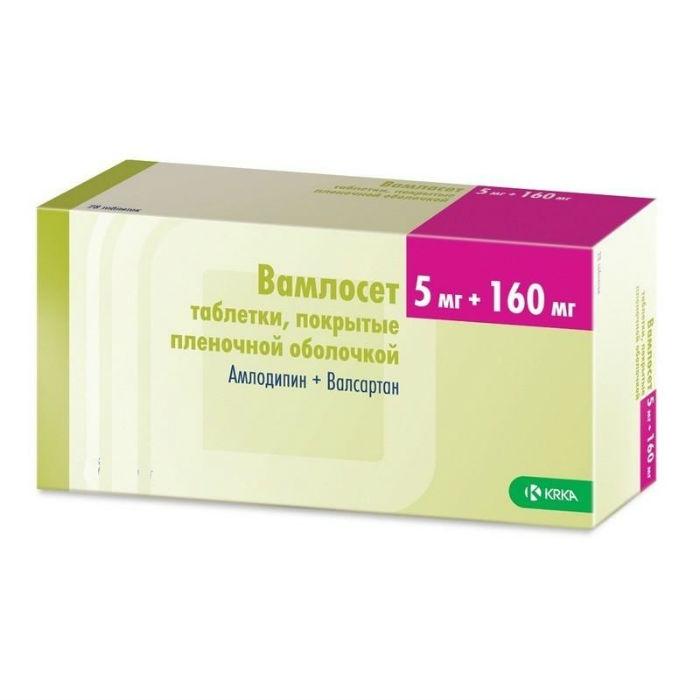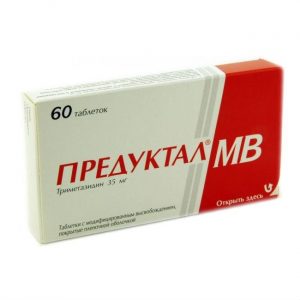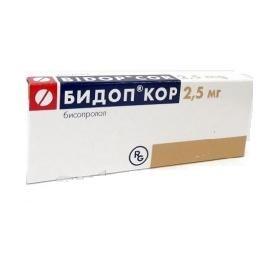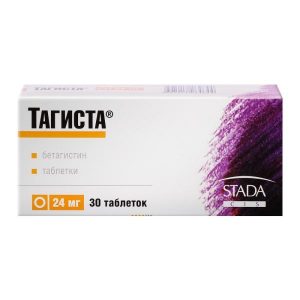Description
Release form
Oval, biconvex, brownish-yellow with possible inclusions of dark color.
Packing
30 pcs
Pharmacological action of
Antihypertensive combined drug (angiotensin II receptor blocker + BMKK)
Indications
Vamloset is prescribed for the treatment of hypertension (if there are indications for combination therapy).
Contraindications
Absolute: severe arterial hypotension (with systolic pressure <90 mm Hg), shock (including cardiogenic shock), severe renal failure (with creatinine clearance <30 ml / min), use in patients who are on hemodialysis for cholestasis, biliary cirrhosis, severe liver failure (> 9 points on the Child-Pugh scale) left ventricular outflow tract obstruction, including hypertrophic obstructive cardiomyopathy and severe aortic stenosis, primary hyperaldosteronism, hemodynamically unstable cardiac failure acute myocardial infarction conditions after kidney transplantation (the effectiveness / safety of therapy for this group of patients has not been studied (n) combined use with aliskiren in patients with diabetes mellitus or impaired renal function (with creatinine clearance < 60 ml / min) under the age of 18 years (the effectiveness / safety of therapy for this group of patients has not been studied) pregnancy and the period of breastfeeding individual intolerance to the components of the drug, as well as other derivatives of the dihydropyridine series. Relative (diseases / conditions in which the administration of Vamlocet requires caution): impaired hepatic function with mild (5-6 points on the Child-Pugh scale) and moderate (7-9 points on the Child-Pugh scale) severity of renal function impairment in mild to moderate severity (with creatinine clearance of 30 50 ml / min) obstructive biliary tract diseases chronic heart failure III IV functional class according to NYHA classification stenosis of a single kidney artery or unilateral / bilateral renal artery stenosis with lower circulating blood volume (BCC), including vomiting and diarrhea hyponatremia, hyperkalemia, restriction of salt intake when dieting mitral / aortic stenosis with mild to moderate hereditary angioedema or the development of edema against the background of previous use of angiotensin II receptor antagonists. Special instructions Symptomatic arterial hypotension may occur with hyponatremia / decreased BCC. Before the start of the course, it is necessary to restore the sodium content / replenish the BCC, the therapy begins under close medical supervision. In cases of a marked decrease in blood pressure, the patient should be placed in a horizontal position, raising his legs, if necessary, enter a 0.9% solution of sodium chloride (by intravenous infusion). After the hemodynamic parameters are stabilized, treatment can be continued. When using VamloSet because of the likelihood of developing dizziness, nausea and fatigue while driving require caution. Composition Active ingredients in 1 tablet: amlodipine – 5 mg (amlodipine besylate – 6.94 mg) valsartan – 160 mg (Valsartan A, granule substance – 251.35 mg, including auxiliary components: microcrystalline cellulose – 82 mg croscarmellose sodium – 4.75 mg povidone – 3 mg sodium lauryl sulfate – 1.6 mg). Auxiliary components: core: mannitol – 50.71 mg magnesium stearate – 9 mg colloidal silicon dioxide – 2 mg shell: Opadry II white (a mixture of polyvinyl alcohol – 40% titanium dioxide – 25% talc – 14.8% macrogol – 20, 2%) – 7 mg dye yellow iron oxide (E172) – 1 mg dye red iron oxide (E172) – 0 mg. Dosage and administration of Vamloset is taken orally 1 time per day with water in a small amount, regardless of the time of meal. The therapy should be started with a dose of 5 mg + 80 mg, if necessary, after 7-14 days, its increase is possible. It is recommended to take 1 tablet per day (in one of the possible dosages). Options for the maximum allowable daily doses: for valsartan – 5 mg + 320 mg, for amlodipine – 10 mg + 160 mg or 10 mg + 320 mg. Side effects Classification of the incidence of side effects WHO: very often (? 1/10), often (? 1/100 to Drug Vamloset Infectious and parasitic diseases: often flu. Metabolism: often – hypokalemia infrequently – hypercalcemia, hyperlipidemia, hyperuricemia, hyponatremia From the nervous system: often – headache infrequently – impaired coordination, dizziness, postural dizziness, paresthesia, drowsiness rarely – anxiety From the organ of vision: infrequently – impaired vision rarely – impaired vision. On the part of the organ of hearing and labyrinth disorders: infrequently – vertigo rarely – tinnitus. From the cardiovascular system: infrequently – a feeling of palpitations, tachycardia, orthostatic hypotension rarely – a pronounced decrease in blood pressure, fainting. From the respiratory system: often – nasopharyngitis infrequently – cough, pain in the throat and larynx. From the digestive system: infrequently – diarrhea, nausea, discomfort in the abdomen, pain in the upper abdomen, constipation, dry mouth. From the skin and subcutaneous tissues: infrequently – erythema, skin rash rarely – exanthema, hyperhidrosis, skin itching. From the musculoskeletal system: infrequently – arthralgia, back pain, swelling of the joints rarely – muscle cramps, a feeling of heaviness throughout the body. From the urinary system: rarely – pollakiuria, polyuria. From the genitals and mammary gland: rarely – erectile dysfunction. Allergic reactions: rarely – hypersensitivity. General disorders and disorders at the injection site: often – asthenia, increased fatigue, swelling of the face, sensation of a rush of blood to the skin of the face, edema, peripheral edema, pasty infrequently – anorexia. In patients treated with amlodipine / valsartan, peripheral edema was less common (5.8%) than in patients treated with amlodipine alone (9%). Amlodipine From the hemopoietic system: very rarely – leukopenia, thrombocytopenia, sometimes with purpura. From the side of metabolism: very rarely – hyperglycemia. Mental disorders: infrequently – depression, insomnia / sleep disturbances, mood lability is rare – confusion. From the nervous system: often – dizziness, headache, drowsiness infrequently – taste disturbance, paresthesia, fainting, tremors, hypesthesia very rarely – muscle hypertonicity, peripheral neuropathy, frequency is unknown – extrapyramidal disorders. From the side of the organ of vision: infrequently – visual impairment, visual impairment. On the part of the organ of hearing and labyrinth disorders: infrequently – tinnitus. From the cardiovascular system: often – a feeling of palpitations, a sensation of a rush of blood to the skin of the face, a marked decrease in blood pressure is very rare – arrhythmias (including bradycardia, ventricular tachycardia and atrial fibrillation), myocardial infarction, vasculitis. From the respiratory system: infrequently – shortness of breath, rhinitis is very rare – cough. From the digestive system: often – nausea, abdominal discomfort, pain in the upper abdomen infrequently – changes in stool, diarrhea, dry oral mucosa, dyspepsia, vomiting rarely – gastritis, gingival hyperplasia, pancreatitis. From the side of the liver and biliary tract: very rarely – increased activity of liver enzymes (most often with cholestasis), increased plasma bilirubin concentration, hepatitis, intrahepatic cholestasis, jaundice. From the side of the skin and subcutaneous tissues: infrequently – alopecia, exanthema, erythema, photosensitivity reactions, itching, hyperhidrosis, purpura, skin rash, skin discoloration very rarely – erythema multiforme, exfoliative dermatitis, Stevens-Johnson syndrome. From the musculoskeletal system: often – ankle swelling infrequently – arthralgia, back pain, muscle cramps, myalgia. From the urinary system: infrequently – violation of urination, nocturia, pollakiuria. From the genitals and mammary gland: infrequently – erectile dysfunction, gynecomastia. General disorders and disorders at the injection site: often – fatigue, peripheral edema infrequently – asthenia, discomfort, malaise, non-cardiogenic heart pain, pain. Laboratory and instrumental data: infrequently – decrease / increase in body weight. Allergic reactions: very rarely – hypersensitivity reactions, urticaria, angioedema. Valsartan From the hematopoietic system: frequency is unknown – decreased hemoglobin and hematocrit, leukopenia, neutropenia, thrombocytopenia sometimes with purpura. Hearing organ and labyrinth disorders: infrequently – vertigo. From the cardiovascular system: frequency unknown – vasculitis. From the respiratory system: infrequently – cough. From the digestive system: infrequently – a feeling of discomfort in the abdomen, pain in the upper abdomen. From the side of the liver and biliary tract: frequency is unknown – increased activity of liver enzymes, increased concentration of bilirubin in blood plasma. On the part of the skin and subcutaneous tissues: frequency is unknown – itchy skin, skin rash. From the musculoskeletal system: frequency unknown – myalgia. From the urinary system: frequency is unknown – increased plasma creatinine concentration, impaired renal function, including acute renal failure. General disorders and disorders at the injection site: infrequently – increased fatigue. Laboratory and instrumental data: frequency unknown – increased serum potassium. Allergic reactions: very rare – hypersensitivity reactions frequency unknown – angioedema. Adverse events that were previously reported with the use of each of the components may occur with the use of the drug Vamloset, even if they were not observed in clinical trials. Amlodipine Often: drowsiness, dizziness, palpitations, abdominal pain, nausea, ankle swelling. Infrequently: insomnia, mood lability (including anxiety), depression, tremor, taste disturbance, fainting, hypesthesia, visual impairment (including diplopia), tinnitus, marked decrease in blood pressure, shortness of breath, rhinitis, vomiting, dyspepsia, alopecia, purpura, skin discoloration, hyperhidrosis, itching, exanthema, myalgia, muscle cramps, pain, impaired urination, increased urination, impotence, gynecomastia, chest pain, malaise, weight gain, weight loss. Rarely: confusion. Very rare: leukopenia, thrombocytopenia, allergic reactions, hyperglycemia, muscle hypertonicity, peripheral neuropathy, myocardial infarction, arrhythmias (including bradycardia, ventricular tachycardia and atrial fibrillation), vasculitis, pancreatitis, hepatitis, gastritis, gastritis, gastritis, gastritis, gastritis, gastritis, gastritis, gastritis, gastritis, gastritis, gastritis, gastritis, gastritis, gastritis, gastritis, gastritis, gastritis, gastritis, gastritis, gastritis, gastritis, gastritis, gastritis, gastritis, gastritis, gastritis, gastrititis enzymes (most often due to cholestasis), angioedema, erythema multiforme, urticaria, exfoliative dermatitis, Stevens-Johnson syndrome, photosensitivity. Separate cases of extrapyramidal syndrome are described. Valsartan Frequency unknown: decrease in hemoglobin and hematocrit, neutropenia, thrombocytopenia, increased potassium in the blood serum, increased activity of liver enzymes, increased concentration of bilirubin in blood plasma, increased concentration of creatinine in blood plasma, impaired renal function, including renal failure, angione edema, myalgia, vasculitis, hypersensitivity, including serum sickness. Drug interaction Wamlocet Combinations requiring attention: other drugs with antihypertensive effects, including diuretics, alpha-blockers, and anti-hypertensive drugs, including tricyclic antidepressants, benign alpha-adrenergic benign drugs, increased hypotensive effect. Amlodipine Undesirable combinations: grapefruit juice / grapefruit – the likelihood of increased bioavailability in some patients and increased hypotensive effect. Precautions: inhibitors (strong or moderate) of the CYP3A4 isoenzyme, including protease inhibitors, diltiazem or verapamil, azole antifungal drugs, macrolides such as clarithromycin or erythromycin: a significant increase in the systemic exposure of amlodipine in elderly patients, such disorders are clinically significant, therefore, they require dose adjustment and medical supervision of simvastatin: a significant increase in its exposure (it is not recommended to exceed a dose of 20 mg simvastatin per day) isoenzyme CYP3A4 inducers – anticonvulsant drugs including phosphenytoin, carbamazepine, phenytoin, phenobarbital, primidone, as well as rifamycin, herbal remedies containing hypericum perforatum: probability of a decrease in plasma hydrochloric blood concentration of amlodipine dantrolene (intravenous): probability of disorders of the cardiovascular system (cardiovascular collapse associated with hyperkalemia ventricular fibrillation with fatal outcome) in patients with a tendency to the occurrence of malignant hyperthermia, the combination is not recommended. Valsartan Contraindicated combinations: Aliskiren – combined use is contraindicated in diabetes mellitus and impaired renal function (with creatinine clearance <60 ml / min). Undesirable combinations: lithium: the likelihood of a reversible increase in the plasma concentration of lithium in the blood and the development of intoxication if necessary, combined use with lithium preparations requires careful monitoring of the plasma concentration of lithium in the blood potassium preparations, potassium-sparing diuretics / food additives and other drugs / substances that may lead to an increase in serum potassium in the blood, including heparin: in cases of need for combined use, control of the plasma content of potassium in the blood is required. Combinations requiring caution: non-steroidal anti-inflammatory drugs (NSAIDs), including selective COX-2 inhibitors, acetylsalicylic acid in a daily dose of 3000 mg and other non-selective NSAIDs: weakening the hypotensive effect, increasing the likelihood of impaired renal function and increased plasma blood at the beginning of the course shows the assessment of renal function, as well as the correction of violations of water-electrolyte metabolism inhibitors of protein transporters, including ritonavir, ri fampicin, cyclosporine: increased systemic exposure of valsartan, which must be taken into account at the beginning / at the end of combination therapy. Storage conditions Do not store above 30 ° C. Keep away from children. The Expiration of is 3 years. Terms leave through pharmacies In retseptu lekarstvennaja form tablets




